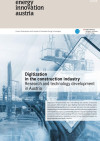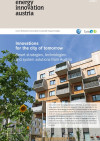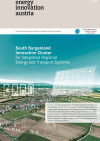Suchergebnisse
Digitization in the construction industry

Research and technology development in Austria
energy innovation austria
4/2018
Herausgeber: BMVIT und Klima- und Energiefonds
Englisch, 8 Seiten
Downloads zur Publikation
E_PROFIL - neighborhood profiles for optimized energy transformation processes
E_PROFIL is a set of methods (an IT-supported toolkit) for the elaboration of neighbourhood profiles. The aim of the project is to facilitate an energy and resource efficient development in the planning practice of Austrian cities. Furthermore, the project is an important asset for research and planning activities in Europe and can also be applied to other neighbourhoods.
MuT - Monitoring of urban Technologies: Classification, Specification, Evaluation
In the frame of the project a classification system for Smart City Technologies had beed developed, the relevance of a wide range of technologies in terms of their potential contribution to the development of sustainable and more resilient cities with a high quality of life had beed evaluated and a comprehensive classification of the technical maturity of relevant technologies, technical (sub-)systems and technology-related services had been given.
CiQuSo - City Quarters with optimised solar hybrid heating and cooling systems
The project CiQuSo aimed to develop, evaluate and optimize concepts for solar energy systems to provide energy for buildings and cities. The applicability of the developed methods and concepts were shown as an example at Itzling, a part of Salzburg city.
Indicators for urban areas – for construction, operation and mobility in climate-friendly areas
Development and coordination of indicators for energy and ecological evaluations of urban areas based on the Swiss 2000-Watt certification system. The results will be used for the development of a quality assurance system for urban areas similar to the klimaaktiv declaration for buildings and the e5 certification for communities.
THERM-opti-BALCONY-P2 - Thermal Optimized Renovation of Balconies Phase 2: In-Situ-Pilot-Station
Pre-cast cantilever balconies represent a particular problem in the case of thermal rehabilitation of buildings. With the THERM-opti-BALKON-System a solution is currently being investigated under laboratory conditions. Phase 2 aims to create an in-situ-pilot-station. The most important object of study is the long-term behavior of the THERM-opti-BALKON-System.
HOTSPOTS - Holistic thermographic screening of urban physical objects at transient scales
HOTSPOTS enables new insights and perspectives for city development. According to the project idea innovations in acquisition and sensing as well as densification of geo-referenced city related data are supplemented by novel processing chains in city data analytics. Driven by an integrated scientific approach we develop a novel method in the selection, evaluation and prioritization of infrastructural city development measures which is directly derived from sensed data hence reducing the risk of ad-hoc decisions or lack in impact.
An innovative approach for facades with optimised noise protection and natural ventilation
The aim of this project was to advance the state of the art in the engineering of double-leaf building facades that facilitate natural ventilation while providing sufficient sound insulation. Realization of natural (window) ventilation is in some instances difficult due to a number of factors. Thereby, noise pollution (especially traffic noise) plays an important role. To address these issues, the project explored innovative solutions in terms of facade constructions for concurrent natural ventilation and noise control.
SüdSan - Socially acceptable, climate-compatible refurbishment of two multi-family-houses as a model for the refurbishment of the Südtiroler-Siedlung Bludenz
Planning, energetic-economic optimisation, construction and monitoring of the costs, comfort and energetic performance of two socially acceptable and climate-target-compatible refurbished smaller apartment buildings in the Südtiroler-Siedlung Bludenz.
TFlex - Temperature-flexibilisation in low-load operation of local district heating systems
Within the research project TFlex it was checked if the losses adherent to small district heating networks during low-load periods can be reduced. One possible solution is by deactivating the network and supplying the customers from previously charged decentralized storages. The optimal clustering of the storages and the possibility of solar-charging the storage were calculated with the aim of a guaranteed one-hundred percent heat supply.
SeasonalGridStorage - Innovative seasonale thermal storages for urban district heating grids
Sensible storages, which are currently used in district heating networks for seasonal storage of excess heat (e.g. from solar thermal or industrial waste heat), exhibit high space demand, investment costs and heat losses. Within this project, concepts for using innovative storage technologies, e.g. thermochemical storages (TCS) having high heat densities and enabling pressure- and lossless storage, were developed and analyzed on a technological, economic and ecological basis. Additionally, the regulatory framework has been evaluated.
see-it - Camera based, user centric daylight control system for optimized working conditions
In the project technologies in the field of building construction and building automation are being researched for quality and performance improvements in the workplace. The aim is to individualize the control of sun protection to the people who need to be protected from glare and overheating and hope to see through.
solSPONGEhigh - High solar fraction by thermally activated components in an urban environment
Within this project the intensive use of thermally activated building elements (TABs) as an additional thermal storage in different buildings, with solar technologies (thermal, PV) preferred for energy supply, was investigated. The aim was to activate and use the thermal storage potential that is immanent in the building elements and thereby achieve solar coverage of the building's heat demand of nearly 100 %.
Eco.District.Heat - Potentials and restrictions of grid-bound heating systems of urban areas
Aim of the project Eco.District.Heat is to provide strategic decision-making support that enables Austrian towns and cities to deal with aspects of grid-bound heating (and cooling) systems in accordance with integrated spatial and energy planning from a holistic perspective when elaborating urban energy concepts.
SMARTIES - SMART Innovative Energy Services - Analysis of requirements of smart energy-services
The emerging development of smart grids provides market opportunities for new ICT-based services ("smart value-added services"). Economic and organizational barriers are foreseeable that could affect the establishment of business models and service providers (data formats, connectivity, controllability, etc.). In order to improve the chances especially for new and local actors, SMARTIES proactively tries to eliminate hindrances of innovation.
FFF-TaliSys - Freeform Systems for Daylighting to be Integrated in a Façade and in a Skylight
In the course of the project FFF-TaliSys novel daylighting systems based on freeform surface technology were developed and implemented into functional models, thus, innovative systems that solve the contradictory requirements of daylighting systems.
Innovations for the city of tomorrow

Smart strategies, technologies and system solutions from Austria
energy innovation austria
4/2016
Herausgeber: BMVIT und Klima- und Energiefonds
Englisch, 16 Seiten
Downloads zur Publikation
3D*3B - 3D-Concret Printing, Reinforcement for low carbon and bending stressed structures.
The project is about 3D printed structural elements and their integration in building structures. The focus is predominantly set on bending stresses structural elements like panels and slabs. Results will point out technical, logistic and climate relevant aspects.
BIM4BIPV - Future aspects of building-integrated photovoltaics (BIPV) in cross-system BIM planning
Research into an end-to-end BIM planning flow for energy-optimised, building-integrated photovoltaics (BIPV) that simultaneously generates solar energy, enables optimal use of daylight and provides shading.
South Burgenland Innovation Cluster

South Burgenland Innovation Cluster for Integrated Regional Energy and Transport Systems
energy innovation austria
1/2019
Herausgeber: BMVIT und Klima- und Energiefonds
Mehrsprachig, 8 Seiten
